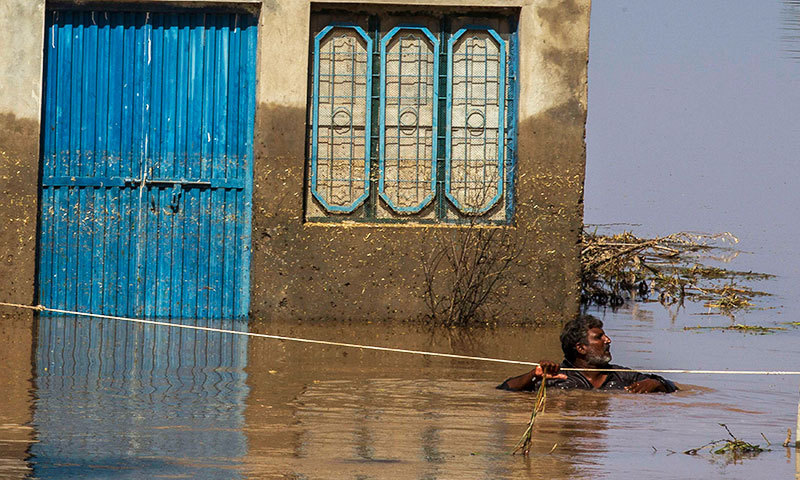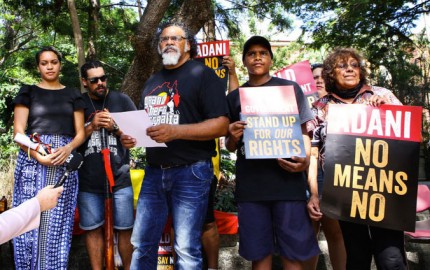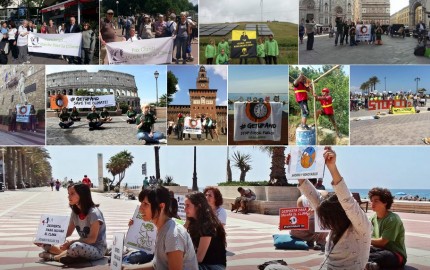#ClimateTracker Aown Kazmi gives us his view on the Pakistan floods, and how they could be prevented in the future

A man uses a rope while he wades through a flooded field beside his house following heavy rain in Pindi Bhattian, Punjab Province. Photo by Reuters
As I began writing this post from the security of my home, I caught a glimpse of the television from the corner of my eye. The news channel showed images of thousands of people from across the country protesting against excessive taxation and demanding an end to corruption.
While some sat right in front of the parliament house to protest, others called for civil disobedience by all citizens through refusing to pay taxes. People are angry, sides are being picked and fingers pointed.
Politicised and complicated, the issue seems irresolvable to some who have lost hope. Meanwhile, devastating floods are wreaking havoc and killing people in hundreds.
Against all this, I couldn’t help but wonder how we treat other issues which are not even controversial and yet, equally devastating. One such issue forms the core of our economic troubles: climate change.
The global phenomenon of climate change, which has been affecting the region, is given minimal to no attention as it’s hastily considered an issue of the future rather than an imminent threat.
The perception couldn’t be more wrong.
Pakistan, with its millions of populace, has been falling victim to agricultural loss, destruction of infrastructure and loss of lives and property at an alarming rate more recently than ever before. All of this has a huge toll on the country’s prosperity and that of yours and mine.
‘But what does climate change have to do with my frustrations as a Pakistani citizen?,’ you may ask.
Well, it has a lot to do with it.
In the past three years alone, repeated floods have inflicted serious damage on Pakistan’s economy, halving its potential economic growt,h and moreover creating the burden of billions of dollars for post-disaster efforts as stated by the World Bank.
A total of $17 billion was lost just in the years 2010, 2011 and 2012, due to lack of preemptive measures to forewarned and recurring floods.
If the initial high-cost climate change adaptation measures were implemented on the national level, as opposed to low-cost mitigation efforts following the floods, the outcome could have been very different, both in financial terms and in the number of lives that could have been saved.
But it doesn’t end here.
There’s also the issue of power shortages, which have left millions of Pakistanis in a state of chronic aggravation, and is obstructing economic growth in the land. Loadshedding in the industrial sector has cost the country over two per cent of the GDP, over US $1 billion of export earnings and potential displacement of more than 400,000 workers as shown by research on the “Economic Cost of Power Outages”.
According to a report published by the International Energy Agency (IEA, 2012), 38 per cent of people in Pakistan remain without access to electricity. In light of this, alternate sources of energy can provide the boon needed to meet this challenge.
The government’s solar energy streetlight project in the city of Gujranawala is worth mentioning.
However, in order to truly meet this obstacle, there needs to be a greater commitment. Wind energy, hydropower, biogas, geothermal and tidal/wave energy projects are currently being carried out successfully across the country on a small scale. It is only through public support and campaigning that we can move towards effectively running these projects on a larger scale to meet with the national energy crisis.
In times like these, it is vital for us to figure out the root cause of our social and economic instability, and initiate countermeasures to fight it. Adaptation to climate change is one such vital measure.
However, not many are willing to do it. As monsoon rains and floods rage on, over 200 people have died and thousands rendered homeless. The monetary price of nature is too expensive for us to neglect.
We simply cannot afford to continue our neglectful ways.
So pay the tax; the tax nobody asked for; the tax you didn’t already offer to pay, the tax that is owed to this planet for the damage we have been doing to it and for our negligence in sustaining it.
Alternatively, you could engage in a ‘civil disobedience’ against climate change by investing in greener initiatives and making it a priority to struggle for a flourishing Pakistan.
This piece was originally published in Dawn









